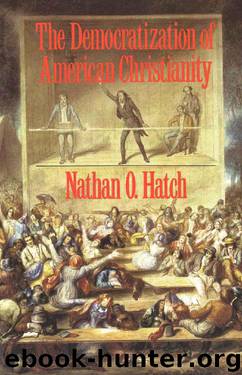The Democratization of American Christianity by Nathan O. Hatch

Author:Nathan O. Hatch [Hatch, Nathan O.]
Language: eng
Format: epub
Publisher: Yale University Press
Published: 1991-01-23T08:00:00+00:00
The Quest for the Ancient Order
Despite the variety of Christian idioms that flowered in the early republic, most seemed to spring from the common conception that Christian tradition since the time of the apostles was a tale of sordid corruption in which kingcraft and priestcraft wielded orthodoxy to enslave the minds of the people. Ties with Catholic and Protestant traditions were severed, with a heady sense that a restoration of the primitive church was at hand. Men such as Benjamin Randal, founder of the Freewill Baptists, called for a new dispensation of gospel liberty. According to Francis Asbury, the apostolic order of things was lost in the first century, and the Reformers had beat off only part of the rubbish of intervening centuries. Methodism claimed emphatically to reinstate the apostolic form of the church in doctrine, discipline, conversion, and sanctification. In John W. Nevin’s view, the American republic had given free reign to an “abstract supernaturalism” empowering believers to transcend the corruptions of eighteen hundred years and return to the simplicity, authority, and power of the age of the apostles. “Every congregation has power to originate a new Christianity for its own use,” Nevin concluded, “and so may well afford to let that of all other ages pass for a grand apostasy.”16
Elias Smith, Lorenzo Dow, Alexander Campbell, Francis Asbury, Barton Stone, Joseph Smith, and William Miller all believed that, since the age of the apostles, a great falling away had severed the relationship between God and man, leaving the visible church virtually extinct during the Dark Ages. They also agreed that, whatever good the Protestant Reformation had done, it had not reopened the heavens or restored authentic Christianity. “The stream of Christianity has become polluted,” wrote Alexander Campbell, “and it is useless to temporize and try experiments. All the reformations that have occurred and the religious chymistry [sic] of the schools have failed to purify it.”17 Each was also convinced that he was a divine channel of purity for the primitive gospel.
In Alexander Campbell’s first journal, The Christian Baptist, published from 1823 to 1830, his regular column, “A Restoration of the Ancient Order of Things,” gave practical advice to congregations about how they could strip away human invention and restore New Testament practice. Matters such as the order of worship, leadership, singing, and discipline were discussed. In his first column he applauded a Baptist association in Fayette County, Kentucky, which proposed a general conference for reform, to “bring the Christianity and the church of the present day” up to the standards of “the state of Christianity and of the church of the New Testament.” Campbell warned, however, that authentic Christianity required far more than the kind of reform undertaken by Wycliffe, Luther, and Calvin. These had only continued a futile cycle of human effort. Restoring the church life of the New Testament required casting off human creeds and traditions, Catholic and Protestant. Campbell premised his advice column on the people’s ability to transcend history, to duplicate the primitive pattern, and
Download
This site does not store any files on its server. We only index and link to content provided by other sites. Please contact the content providers to delete copyright contents if any and email us, we'll remove relevant links or contents immediately.
Resisting Happiness by Matthew Kelly(3176)
The Social Psychology of Inequality by Unknown(2721)
Designing Your Life by Bill Burnett(2580)
Day by Elie Wiesel(2558)
The Giving Tree by Shel Silverstein(2146)
Angels of God: The Bible, the Church and the Heavenly Hosts by Mike Aquilina(1857)
Human Design by Chetan Parkyn(1826)
The Supreme Gift by Paulo Coelho(1735)
Jesus of Nazareth by Joseph Ratzinger(1686)
Augustine: Conversions to Confessions by Robin Lane Fox(1671)
Hostage to the Devil by Malachi Martin(1642)
7 Secrets of Divine Mercy by Vinny Flynn(1598)
Dark Mysteries of the Vatican by H. Paul Jeffers(1583)
The Vatican Pimpernel by Brian Fleming(1561)
St. Thomas Aquinas by G. K. Chesterton(1534)
Saints & Angels by Doreen Virtue(1510)
My Daily Catholic Bible, NABRE by Thigpen Edited by Dr. Paul(1399)
Called to Life by Jacques Philippe(1389)
The Ratline by Philippe Sands(1388)
